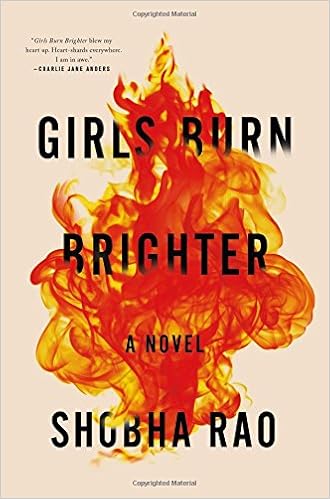 The novel
begins in India in 2001. Poornima and
Savitha, two teenage girls living in abject poverty, meet and, quickly, each
becomes the other’s confidante and solace.
This friendship, in many ways their only positive, sustaining
relationship, shapes their entire lives.
When Poornima’s father sets out to arrange his daughter’s marriage, the
two girls worry that she will marry “a man who lived too far away for Savitha
to visit.” It is not marriage but an act
of brutal violence that tears the girls apart.
Savitha ends up running away and eventually Poornima also flees from an
intolerable situation. The novel details
Savitha and Poornima’s separate journeys; Savitha seeks freedom and Poornima is
determined to find her friend.
The novel
begins in India in 2001. Poornima and
Savitha, two teenage girls living in abject poverty, meet and, quickly, each
becomes the other’s confidante and solace.
This friendship, in many ways their only positive, sustaining
relationship, shapes their entire lives.
When Poornima’s father sets out to arrange his daughter’s marriage, the
two girls worry that she will marry “a man who lived too far away for Savitha
to visit.” It is not marriage but an act
of brutal violence that tears the girls apart.
Savitha ends up running away and eventually Poornima also flees from an
intolerable situation. The novel details
Savitha and Poornima’s separate journeys; Savitha seeks freedom and Poornima is
determined to find her friend.
The book is
very much about the unbreakable bond of a true friendship. Poornima is named after the moon and Savitha,
after the sun, and each brings light into the life of the other. Poornima’s mother is dead and her father
admits to wishing he had let Poornima drown when she was a child, so Savitha
gives her the love she has missed.
Savitha, whose family scours the garbage dump, thinks of the few real
treasures she has; the first one she lists is “her love for Poornima,” and when
Savitha runs away, the only thing she takes with her is an unfinished sari she
was making for Poornima. This piece of
cloth Savitha desperately clings to throughout her tortuous ordeals. Meanwhile, Poornima makes it her sole
ambition to find her friend.
Another
theme is the lack of value girls and women have in the world: “You are nothing. You are a girl.” Neither of the girls knows her birthdate
because “Only the birthdates of the boys were recorded in the village.” If Poornima’s father demands a second helping
of curry, Poornima and Savitha are left “with only a spoonful to share” and
have to fill up on rice. Poornima
realizes early on that her life is expected to be like her mother’s: “That’s all she could recall her mother ever
doing: something for someone else. . . .
never for herself.” During her wedding
ceremony, Poornima notices her husband looking at her in a way she recognizes
is not peculiar or unfamiliar: “It was,
in fact, the most familiar look of all. It
was the look of a man: undressing her,
teasing off her clothes, her innocence, ripping it with his teeth, biting at
the tender heart of it, and then laughing and cruel, savoring the completeness
of his incursion, its terror and its desire.”
Poornima encounters a young girl who admits being afraid of a woman whose
face was burned with oil, and Poornima comments, “We girls. Afraid of the wrong things, at the wrong
times. Afraid of a burned face, when
outside, outside waiting for you are fires you cannot imagine. Men, holding matches up to your gasoline
eyes. Flames, flames all around you,
licking at your just-born breasts, your just-bled body. And infernos.
Infernos as wide as the world.
Waiting to impoverish you, make you ash, and even the wind, even the
wind. Even the wind . . . watching you
burn, willing it, passing over you, and through you. Scattering you, because you are a girl, and
because you are ash.”
Savitha learns
the same lessons. She realizes “that’s
all she’d ever been in the eyes of men:
a thing to enter, to inhabit for a time, and then to leave.” Later,
she concludes that “girls . . . was
just another word for profit” and “Every moment in a woman’s life was a deal, a
deal for her body: first for its
blooming and then for its wilting; first for her bleeding and then for her
virginity and then for her bearing (counting only the sons) and then for her
widowing.”
The book is
often a harrowing read. It depicts rape,
prostitution, physical and psychological abuse, and human trafficking. Poornima and Savitha encounter relentless abuse
and very few good people. Men, in particular,
are evil. Any man who has redeeming traits
seems to be weak. The spirits of the two
protagonists, however, despite their experiences, continue to burn
brightly. Poornima mentions “How little
time it takes to sever the spirit . . . if the spirit is disposed to severing.” But the strength and resilience of the two is
almost unbelievable.
The last
part of the book is also unbelievable because there are just too many convenient
coincidences towards the end. And then
there’s the ending itself, one which provides fodder for book club discussions: is it the perfect ending which allows readers
to imagine the next step, or did the author cheat readers?
I agree
that we still live in a patriarchal world full of misogyny but I have more hope
than is offered by this book which suggests that women “were never safe . . .
not against anything” and to believe that standing together would protect them, as if “two
bodies – the bodies of two girls –
were greater than one” was foolish. At
times, the message about the difficult journey of being female is delivered in
rather a heavy-handed manner.
No comments:
Post a Comment